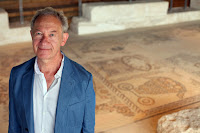I
say ‘penultimate’ because Classical Civilisation, thankfully, is still offered
by the other exam board, OCR (Oxford, Cambridge and RSA), which has just revised
its
specs from 2017 and as yet shows no sign of pulling out on the Greeks and
Romans in British schools.
But
the AQA decision, surrounded in secrecy, is a body blow. It comes while I am anxiously waiting to hear
the results of a major funding application to support a nationwide campaign,
starting next May, to get Classical Civilisation and Ancient History teaching
expanded and into as many schools as possible.
It
is easy to criticise AQA, which claims on its website to be ‘an
independent education charity’ (the impression is spoiled by all the links to
the businesses in what AQA calls its ‘family’, selling resources you can buy for
the classroom or your teenager).
The
AQA Council is in charge of its ‘overall strategy, policy, educational
initiatives and development, and for steering AQA to fulfil its educational and
charitable objectives’. Unfortunately, these objectives are nowhere
stated, and when one discovers the identity of the Chair of the Council, things begin to become clearer.
 |
| Paul Layzell Walks through RHUL Sit-In for Classics, 2011 |
But
the problem is systemic rather than personal. Layzell and the other bureaucrat-profiteers
who have taken over our national education system can only do so because we
have let them. Aristotle, no political ‘leftie’, was astonished that any
self-respecting society should allow the curriculum followed by all its children and young adults to be
determined by anything other than informed
public interest—it is simply far too important to be left to ‘market forces’.
Members of all the constituencies—academics,
teachers, subject associations, educational charities—believing that the Greeks
and Romans belong to everyone need to react publicly to this development and
unite to prevent OCR from following AQA’s suit and killing off Classical
Civilisation in UK schools for good. We do not want to suffer the same fate as
Art History and Archaeology, for which AQA has now ensured no school
qualifications are available in the UK at all.
 |
| Simon Schama is Defending Class Civ |


I think I'm even angrier about Art History and Archaeology, where, as you say, there are now no A-levels at all (and the blithe AQA statement of 'it's all right, they can be studied at university' ignores how the lack of an A-level weakens recruitment, and therefore provision, at university level). But I am angry about this, which leaves the subject dependent on the good grace of OCR, and however much they promise that they have no plans to get rid of it (and I believe them), such precarity is not good. It's the (temporary, I hope) triumph of the likes of Harry Mount, who believe that the philological approach is the only acceptable one to antiquity, and whilst asserting their desire to see more Classics in state schools, dismiss the prime instrument of achieving that. (One day I will actually write up my rant about why philology is not necessarily the best training for all Classicists, given its propensity to produce historians who don't understand historical process, writers on love poetry who seem out of touch with emotions, or writers on comedy who can't spot a joke.)
ReplyDeleteOh Tony, thanks for this. Please please do write you rant!! Would you like to do a guest blog one week?
ReplyDeleteUmm, possibly, yes, but not until I've cleared out a few other things that I'm committed to. (There's a couple of paras in this piece that show the way I'm thinking.)
DeleteI've been negotiating my way through this battleground for more than a quarter of a century. In 1989 I had to move to London in order to study ancient Mesopotamian languages. It was hard enough at that time to study ancient Greek in Edinburgh, but there was an evening class (which later managed to survive as an introduction to New Testament Greek). The spirit of the time is against a widespread understanding of the ancient world. Not because such an understanding reveals our modern shallowness (which it does), but because neo-cons and neo-liberals want us to live in a world which entirely conforms to their understanding of what is important. Which of course is the power of the market. A dud religion if ever I saw one.
ReplyDeleteSurely one problem may be the survival of Classics at Oxbridge for comprehensive school pupils, without 'dumbing down' further the requirements of the syllabus, as well as on entry? My Grade As at A-level Latin and Greek, and Grade 1 at S-level Latin, were taken in my north-eastern comprehensive, an erstwhile grammar school, before a scholarship at Cambridge. At the time, A-levels were required in both Latin and Greek in order to be accepted for Oxbridge, so I did A-level Greek from scratch in two years in my comprehensive. Both Latin and Greek are long gone from my school and my younger Classics teacher turned to teaching IT, while the older one retired. I wonder if any pupils from my town have ever become classicists since then...?
ReplyDeleteWhy target AQA? Who created the conditions in schools that are squeezing the life out of these subjects? (He may have failed to become PM, but even he didn't dare propose the educational policy the present one is espousing.) And don't worry about OCR. They can even afford to scrap French, German, Spanish et al. Have you seen the size of the new building they're erecting in Cambridge? Who knows - maybe WJEC can build on their own real success with Latin and develop qualifications in other classical subjects that will widen access further in nonselective state schools. Festina lente.
ReplyDelete